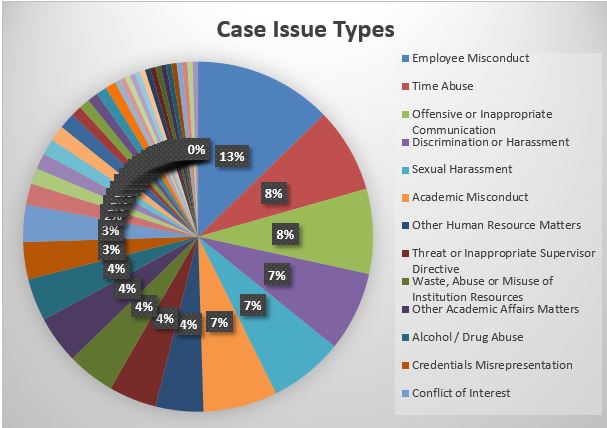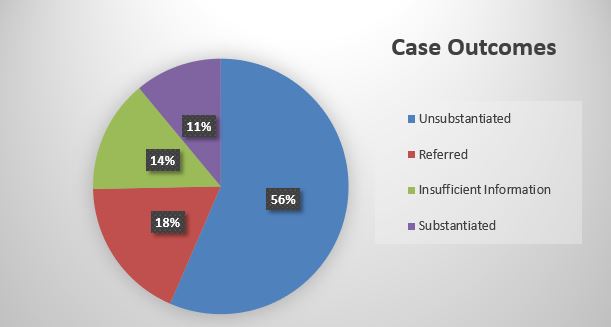IntegrityStar, July 2019 edition
The UCF IntegrityLine launched on September 29, 2014 and received a total of 72 reports the first year. Since then, we have seen a significant increase in the amount of reports filed. Below is additional information you might find interesting about the reports received in 2018.
During the 2018 calendar year, the UCF IntegrityLine received a total of 213 reports, 204 containing allegations of suspected misconduct or ethical concerns and nine inquiries. Reports received through the UCF IntegrityLine containing allegations of misconduct were triaged between University Compliance, Ethics, and Risk and University Audit. Based on the nature of the report, it was either investigated by University Compliance, Ethics, and Risk, University Audit, investigated jointly by both offices, or referred to the appropriate compliance partner for review. Reports involving students under the UCF Golden Rule were referred to the Office of Student Rights and Responsibilities and reports criminal in nature were referred to the UCF Police Department.
Issue Type
The types of issues reported to the UCF IntegrityLine spanned a range of more than 40 specific topics. The highest number of reports in a single category were 26 (representing 13%) categorized as Employee Misconduct. These reports included complaints ranging from allegations of harassing or bullying behavior, hostile work environment, favoritism, conflicts of interest, and other violations of university policy. The second highest reported issues were time abuse and offensive or inappropriate communication.

Closed Cases
University Compliance, Ethics, and Risk reviewed, investigated as necessary, and closed 154 cases during the 2018 calendar year. Below are the outcomes for the closed cases.

Cases Investigated
A total of 104 cases were investigated with the following outcomes:
- Substantiated. There were 17 substantiated cases (representing 11% of all closed cases) where investigations yielded enough evidence to support the complaint and a finding that misconduct occurred. These cases required action by the university. The substantiated cases range in topic from academic misconduct, offensive or inappropriate communication, other academic affairs and human resources issues, safety and time abuse.
- Unsubstantiated. The 87 unsubstantiated investigations (56% of closed cases) yielded insufficient or no evidence to support that misconduct occurred. Of these, 77 (representing 89%) still resulted in recommendations for improvements in a policy, process, or training due to identified weaknesses.
Cases Not Investigated
50 cases were not investigated (representing 32% of closed cases) for the following reasons:
- Insufficient Information. In 22 of these cases (44%), questions were posted to the reporter requesting additional information with no response. These cases were closed due to insufficient information.
- Referred. The remaining 28 cases (56%) were referred to a college, another central office such as Human Resources, UCF Police Department, or to the Office of Student Conduct to review through the appropriate university process.